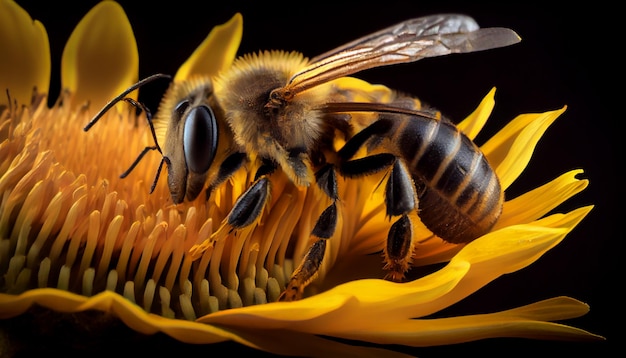
I’m a big fan of beeswax candles and honey, but honey bees are crucial for much more than just these products. Many of the foods we eat depend on honey bees for pollination. For example, they help increase the number and size of strawberries and are completely necessary for pollinating almonds. If honey bee numbers drop, it would impact many crops negatively – imagine having no almond butter!
Last year, about 42% of bee colonies died, which has made people wonder how they can help. Here are a few simple things each of us can do to support honey bees and strengthen their population.
Our love for picture-perfect lawns and long-lasting flowers has reduced food sources for bees. Many people get rid of dandelions and clover, which are great early spring pollen sources, and many flowers and trees sold today look beautiful but don’t offer much nectar for bees. Flowers like sunflowers, asters, and black-eyed Susans, among others, provide bees with the nectar and pollen they need. You can find a free planting guide for bee-friendly plants at Pollinator.org. Your local greenhouse can also help you find plants that attract honey bees.
Most of us think about planting flowers for bees but forget that flowering trees are a major nectar source for them. Not all flowering trees are helpful though. Bradford Pear, for example, isn’t a good nectar source despite its many flowers. Instead, bees love trees like Tulip Poplar, Maple, and Redbud, which are great for landscaping and feeding bees.
Bees aren’t pests, but many pesticides don’t discriminate and can harm bees. Even organic pest controls might negatively affect bees, so it’s crucial to think of them before using such treatments. Additionally, avoid plants treated with neonicotinoids, a type of pesticide that integrates into the plant and its nectar, potentially harming bees.
Supporting local beekeepers is one of the best ways to help bees. My oldest son got into beekeeping and cares for his hive weekly. Beekeepers face issues like bee mites (specifically the Varroa destructor), pesticides, and the competition against cheap and possibly adulterated honey. Buying honey from local beekeepers supports healthy bee populations and ensures good-quality honey. Besides honey, beekeepers sell beeswax for various products and other beneficial bee products like royal jelly, bee pollen, and bee propolis.
Buying organic foods benefits both you and honey bees as it reduces pesticide use. As organic food demand increases, pesticide use should decrease, creating a safer environment for bees. Beekeeping is getting popular, but it’s not allowed everywhere. Learn about local laws and support efforts to allow urban beekeeping. If you ever see a bee swarm, contact a beekeeper instead of trying to handle it on your own, as it’s actually when bees are most docile.
Several years ago, I started beekeeping to get more bees in our garden. Initially, I was startled by them, but I realized most of my bad experiences weren’t with honey bees but with yellow jackets and wasps. Distinguishing between them helped me appreciate honey bees as beneficial pollinators instead of pests.
Beekeeping is a fantastic way to engage with nature. Start by learning about it, connecting with local beekeepers, and maybe joining a beekeeping association. If you’re not quite ready to start beekeeping, you can help by hosting a hive on your property for a beekeeper to manage.
Ever considered beekeeping?

